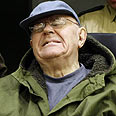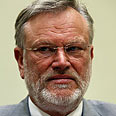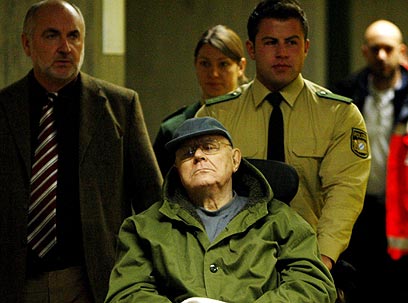
Demjanjuk during Monday's hearings
Photo: AP

Busch. A provocateur
Photo: AFP
Demjanjuk's lawyer argues Jewish 'kapos' worse than Nazis
89-year-old sat in his wheelchair, showed no emotion as eight plaintiffs, some of them with tears in their eyes and their voices breaking, described how they had survived the Holocaust while their relatives perished. His lawyer, unable to provide source, says Jewish camp guards treated Jews worse than Nazis did
John Demjanjuk sat impassively while Holocaust survivors on Monday recalled the horrors of Nazi Germany at his trial on charges of helping to force 27,900 Jews into gas chambers in 1943.
Demjanjuk's lawyer, Attorney Ulrich Busch caused a stir in the courtroom when he claimed that prisoner-functionary Jews who served as foremen in the camps, also referred to as "kapos," were "worse than the Nazis."
German state prosecutors accuse Demjanjuk, who was top of the Simon Wiesenthal Center's list of most-wanted war criminals, of assisting in killings at the Sobibor death camp in Poland, where prosecutors say at least 250,000 Jews were killed.

Wardens wheel Demjanjuk into courtroom Monday (Photo: AP)
The 89-year-old sat in his wheelchair and showed no emotion as eight plaintiffs, some of them with tears in their eyes and their voices breaking, described how they had survived the Holocaust while their relatives perished.
Demjanjuk denies he was involved in the Holocaust and his family insists he is too frail to be standing trial.
The defendant's lawyer, Attorney Ulrich Busch - who already created a storm during the first hearing when he claimed that Demjanjuk himself is a Holocaust survivor – tried to caused an uproar during his cross-examination of the witness. "Is it not true that the Jewish police were worse than the Nazis?" he asked in a highly controversial move.
Busch said he had read that the Jewish prisoner-functionaries in the Dutch collective camp of Westerbork treated the Jews who were sent to Sobibor much worse than the SS did. When the court and the outraged prosecution lawyers asked where Busch found the questionable information, he could not name a source, but said: "If you Google it, you'll find it."
The prosecution claims that Demjanjuk did not just "follow orders" he received from the Nazis, but was an enthusiastic supporter of the party ethos and even shoved Jews into the gas chambers.
Monday's deliberations were dedicated to plaintiff's testimonies. Philipp Jacobs, 87, from Amsterdam, came to Munich to testify on the atrocities he experienced at the hands of the Nazis and the loss of his parents and fiancée, Ruth, in Sobibor. All three of them where gassed on July 23, 1943. He only heard about their death three months after the end of the war. "I lost the love of my life. To me, the past is everyday life," he said, choking back tears. The old man's sister also perished in the Holocaust in Auschwitz.
One of the plaintiffs, Robert Cohen, 83, whose brother and parents were killed at Sobibor, described his experiences at Nazi death camps including Auschwitz.
"We didn't know what was going on," the Amsterdam-born pensioner told the court during the morning session. "We thought we had to work."
Due to Demjanjuk's frailty, hearings are limited to two 90-minute sessions a day. His case is likely to be Germany's last major Nazi-era war crimes trial.
Demjanjuk was born in Ukraine and fought in the Soviet army before being captured by the Nazis and recruited as a camp guard. He emigrated to the United States in 1951.
In May, he was extradited from the United States where he had lived in a suburb of Cleveland, Ohio.
Demjanjuk has acknowledged being at other camps but not at Sobibor, which prosecutors say was run by between 20 and 30 members of the Nazi SS and up to 150 Soviet former prisoners of war.
In the Sobibor gas chambers, Jews died within 20 to 30 minutes after inhaling a toxic mixture of carbon monoxide and carbon dioxide, prosecutors said. Groups of about 80 were forced into gas chambers measuring about 4 by 4 meters (13 ft by 13 ft).
Reuters contributed to this report















